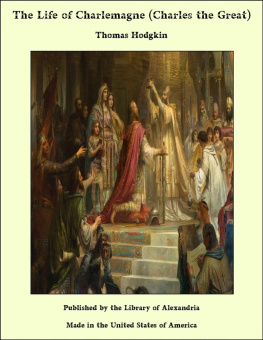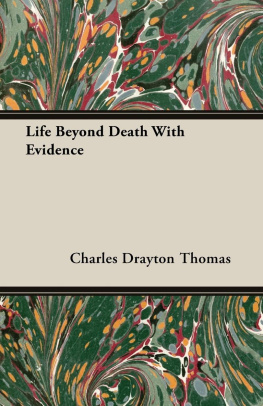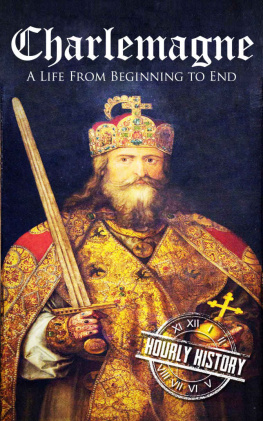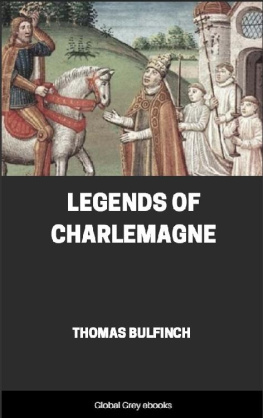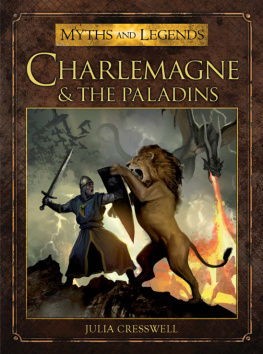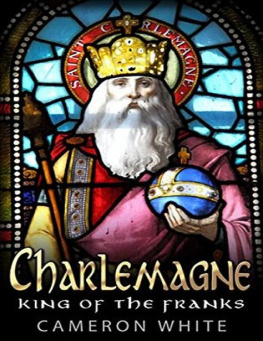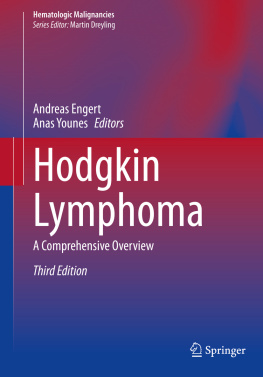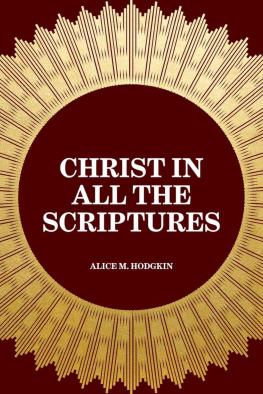Transcribers Note:
Cover created by Transcriber, using an image from the original book, and placed in the Public Domain.
CHARLEMAGNE
Painting by Albrecht Drer.
THE LIFE OF
CHARLEMAGNE
(CHARLES THE GREAT)
By THOMAS HODGKIN, D.C.L.
WITH NOTES
By HENRY KETCHAM
Publisher's logo
A. L. BURT COMPANY,
PUBLISHERS, NEW YORK
Copyright, 1902,
By E. A. BRAINERD.
PREFACE.
In attempting to compress the history of the great Emperor Charles within the narrow limits of the present volume, I have undertaken a difficult task, and I trust that my fellow-historians will consider, not how much has been omitted, but how much, or rather how little, it was possible to insert.
It may be thought that I might have gained space by proceeding at once to the beginning of Charless own reign instead of devoting more than eighty pages to his predecessors, but this did not seem to me possible. The great Emperor was the last term of an ascending seriesnobles, mayors of the palace, kings; and in order to understand the law of the series it is absolutely necessary to study some of its earlier members....
A few words as to our authorities. For the period before the accession of Pippin our chief authority is the chronicle which is known by the name of Fredegarius, very meagre, and written in barbarous Latin, but honest; then a still more miserable continuation of this work by an unknown scribe; and lastly, a much better performance, from a literary point of view, The Lives of the Bishops of Metz, by Paulus Diaconus.
For the reigns of Pippin and of Charles the Great we have fairly satisfactory materials in the shape of the Annals, which now began to be kept at various monasteries; chief among them the Annales Laurissenses majores, so-called from their connection, real or supposed, with the great monastery of Lorsch (in Hesse-Darmstadt, about ten miles east of Worms). So extensive, however, is the knowledge of State affairs possessed by this writer that it is the opinion of Professor Ranke, and of most modern inquirers, that he cannot have been a mere monk writing his chronicle in a convent, but that we have here in fact the chronicles of the Frankish kingdom. This view is to some extent confirmed by the fact that there is a fuller recension of them in a more literary form, which bears the name of Annales Finhardi, and thus professes to be the work of Charless friend and secretary. The precious Vita Caroli, from the pen of the same writer, is described in the following pages.
The writers who in modern times have treated of the life of Charles the Great number some hundreds, and I make no pretension to even a superficial acquaintance with the bibliography of so vast a subject, but I may mention that the books which I have found most helpful in the composition of the following pages are Waitzs Deutsche Verfassungsgeschichte, Guizots Lectures on the History of Civilization, Dahns Urgeschichte der germanischen und romanischen Vlker, and pre-eminently the series of Jahrbcher der deutschen Geschichte, in which Bonnell has treated of The Beginnings of the Carolingian House; Oelsner, of The Life of Pippin, King of the Franks; and Abel and Simson, of The Life of Charles the Great. To the last work (in two volumes) I have been under great and continual obligation.
THOS. HODGKIN.
CONTENTS.
| TO THE BIRTH OF CHARLEMAGNE. |
| CHAPTER I. |
| PAGE |
| Introduction |
| CHAPTER II. |
| Early Mayors of the Palace |
| CHAPTER III. |
| Pippin of Heristal and Charles Martel |
| CHAPTER IV. |
| Pippin, King of the Franks |
| FROM THE BIRTH OF CHARLEMAGNE. |
| CHAPTER V. |
| Fall of the Lombard Monarchy |
| CHAPTER VI. |
| The Conversion of the Saxons |
| CHAPTER VII. |
| Revolts and Conspiracies |
| CHAPTER VIII. |
| Roncesvalles |
| CHAPTER IX. |
| Wars with Avars and Sclaves |
| CHAPTER X. |
| Relations with the East |
| CHAPTER XI. |
| Carolus Augustus |
| CHAPTER XII. |
| Old Age |
| CHAPTER XIII. |
| Results |
| Appendices |
| A. Genealogy of the Ancestors of Charles the Great |
| B. Family of St. Charles the Great |
PART I.
TO THE BIRTH OF CHARLEMAGNE.
CHAPTER I.
INTRODUCTION.
In the gradual transformation of the old world of classical antiquity into the world with which the statesmen of to-day must deal, no man played a greater part than Charles the Great, such as the foundation of Constantinople, Alarics capture of Rome, the Hegira of Mohammed, the discovery of America, the Reformation, and the French Revolution, which have no merely artificial existence. We can see that the thoughts of the great majority of civilized men were suddenly forced into a different channel by such events, that after they had occurred, men hoped for other benefits and feared other dangers than they had looked for before these events took place. And such a changeful moment in the history of the world was undoubtedly the life of the great ruler who is generally spoken of as Charlemagne, and pre-eminently the year 800, when he was crowned as Emperor at Rome.
When Charles appeared upon the scene, the Roman Empireat least as far as Western Europe was concernedhad been for more than three centuries slowly dying. An event, to which allusion has just been madethe capture of Rome by Alaric in 410had dealt the great world-empire a mortal blow, and yet so tough was its constitution, so deeply was the thought engraven even on the hearts of its most barbarous enemies, Rome is the rightful mistress of the world, that it seemed as if that world-empire could not die. The Visigoth, the Ostrogoth, the Vandal, the Burgundian, the Lombard, coming forth from the immemorial solitude of their forests, streamed over the cities and the vineyards of the Mediterranean lands, and erected therein their rude state-systems, their barbaric sovereignties; but even in framing their uncouth national codes they were forced to use the language of Rome; in government they could not dispense with the official machinery of the Empire; in religious affairs, above all, they found themselves always face to face with men to whom the city by the Tiber was still Roma caput mundi. Hence in all these new barbarian kingdoms that arose on the ruins of the Empire there was a certain feeling of precariousness and unrest, a secret fear that the power which had come into being so strangely and so unexpectedly would in a moment vanish away, and that the Roman Augustus would assert himself once more as supreme over the nations; to borrow a phrase from the controversies of a much later date, the Visigothic and Burgundian and Lombard kings were obviously kings de facto; but there was a latent consciousness in the minds of their subjects, perhaps in their own also, that they were not kings de jure.
Had the Italian peninsula been less easily accessible by way of the Julian Alps, or had Rome been situated in as strong a position as Constantinople, it is possible that this secret belief in her rightful predominance might have won back for a Roman emperor that dominion over Europe which was in fact wielded for a time by the Roman popes. But the virtual transference of the seat of empire from the Tiber to the Bosphorus, which was the result of the foundation of the new Rome, though these reconquests were effected in the name of a Roman Augustus, it was felt, and often loudly asserted, that the armies which fought under the imperial standards were Greek rather than Roman. Thus, through all the kingdoms of the west, even while the emperor enthroned at Constantinople was looked upon as in some sense the legitimate monarch of the world, the old deep-rooted hostility between East and West also made itself felt, and it was becoming every day more improbable that the western lands should ever be brought under the rule of a Byzantine Csar.

